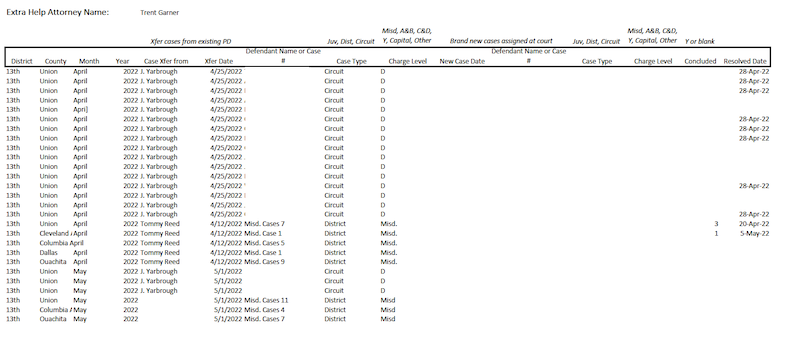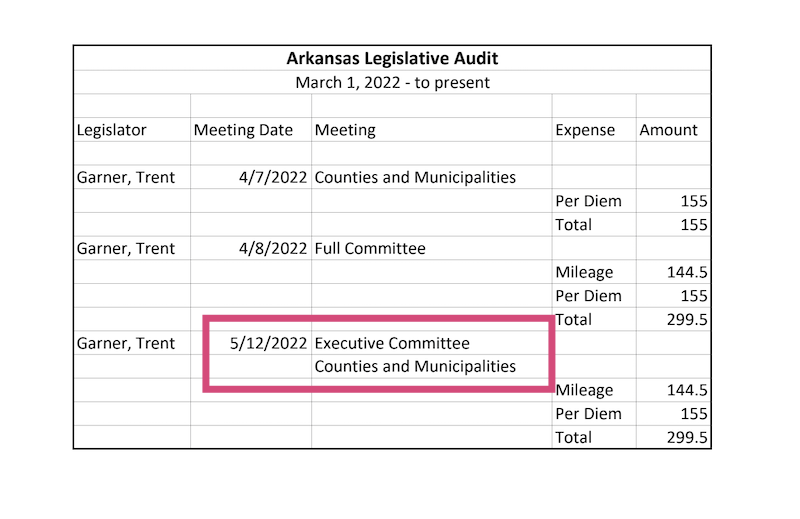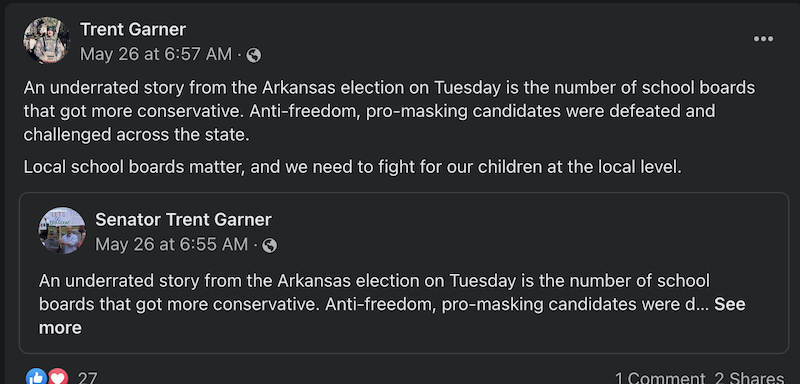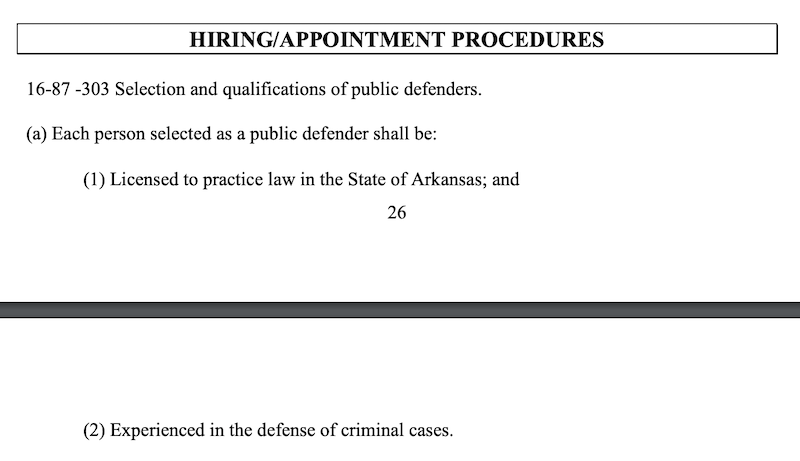If you have read the first three posts about this whole Sen. Trent Garner, Public Defender, debacle, you know that his start date with the 13th Judicial District was April 12 and that his last day was June 3. According to the calendar,1 once you account for holidays, 4/12 through 6/13 contains 38 non-holiday weekdays, across eight full or partial weeks.
Eight weeks at up-to-30-hours per week works out, at the most, to 240 hours. According to Arkansas Public Defender Commission pay records, Trent Garner worked 239 hours while illegally employed there. So, on the surface, at least that part is all good.2
The problem for Trent Garner, as Capt. Edward Smith would certainly confirm if not for that danged ol’ iceberg, is that it’s below the surface is where things get interesting. So let’s hop in this bathysphere and dive down deep.
For context as we move through the upcoming documents, let’s start with Trent Garner’s case log, courtesy of the Arkansas Public Defender Commission. I have redacted out individual names for the people he represented in circuit court.

According to this list, Garner was assigned 17 circuit-court defendants (with a total of 19 charges between them), with 15 defendants (16 charges) assigned to him on April 25 and 2 more defendants (3 charges) assigned on May 1. Eight of the charges that Garner was assigned on 4/25 resolved via guilty plea on or about 4/28, just three days later. To say that it is unlikely that Garner’s inexperienced self negotiated all of these pleas would be an understatement, however; one of the plea agreements had actually been signed by the prior public defender on or about 4/12, and–at most–Garner was simply producing CO2 in the courtroom on 4/28 when that one was accepted by the judge.
The other category of cases on the list above are misdemeanors across the five district courts in the 13th Judicial District. All told, the list shows Garner as having some amount of in-court responsibility for 45 such misdemeanors, with 23 assigned to him on 4/12 and another 22 assigned on 5/1. Of those, let’s see…he resolved…four. Four? Four. Three on April 20 and one on May 5.
So, just to be generous, let’s give Garner credit for all eight felony charges (seven clients) that pleaded guilty on 4/28, as well as the four misdemeanor cases that show as concluded on this list. Let’s even give him credit for one more felony case that doesn’t show as resolved on this list, but shows a guilty plea entered in May on CourtConnect.
All together, that means Garner cleared, at most, thirteen cases in his time as a public defender, with only five such clearances happening after 4/28. Literally 62% of his case clearances happened on a single day, barely over two weeks into the job.
Got all that? Good. Now, let’s take a look at his time sheets. To help us keep all of this straight, I am going to post the timesheets three separate times, with different highlight on each of the three. I’ll explain what each set is as we go over it, then I’ll include a final set of timesheets that have all of the highlight overlapping, so you have a visual frame of reference.
Overlapping Public Defender Hours & Committee Meetings
Since the thing that makes Garner’s working as a PD illegal is the fact that he is still a sitting state senator, I figured we would first look at how the PD job overlapped with his senate duties. After all, Garner has long been known as someone who, ahem, benefits quite a bit from the mileage and per diem that come with out-of-session committee meetings in Little Rock.
All of the entires highlighted in pink in the PDF above are days where Garner submitted time for work done as a public defender while also getting per diem and mileage for attending meetings in Little Rock.
Here’s the bulk of his legislative committee meetings for the relevant time period, highlighted in blue or pink.
He also had one mileage/per diem check from Legislative Audit for this time period:

And he had one mileage/per diem payment from the Arkansas Senate in this period as well:

Armed with all of that information, let’s look at some highlights (and please, feel free to dig deeper, because these are literally just the most obvious issues):
***On April 18, Garner was at the ALC-Higher Education subcommittee meeting in Little Rock. That meeting started at 1pm and ran until 3:15pm, which can be confirmed by the video of that meeting, as can Garner’s attendance (he asks a question around the 1:55pm mark). Yet, somehow, despite being in this committee meeting from 1-3:15 and asking questions, Garner was also able to bend the space-time continuum enough that he could also claim to have done public defender work from 2 to 4pm on that same day. Indeed, Garner claimed a total of six hours of PD work for 4/18, with one from 6-7am, three from 9am-noon, and two from 2-4pm. But it’s 2 hours from his house to Little Rock, and the meeting started at 1, so he would have to have left down there by 11am or so at the latest, which makes his 11-noon portion of claimed PD a bit suspect as well.
***On April 25, Garner had the Joint Performance Review meeting at 1pm in Little Rock, and he claimed four hours of public-defender time that morning, with one from 6-7am and three from 9-noon. Though, considering the two-hour drive from his house to Little Rock, he would have to have left south Arkansas by 11am or so, meaning that, at the very least, the 11am-noon portion of that PD time is suspect.
***On May 2, Garner had the Senate & House Joint Education committee meeting in Little Rock, starting at 1pm. Garner, however, did not show up to this meeting until 3:09pm, which you can see as he arrives on camera in this screenshot. And, if you look at the shirt he’s wearing in that screenshot, then compare it with this Facebook post from May 2:

It’s pretty clear that the reason he was running late to the committee meeting was because he was at MEPS, the Little Rock Military Entrance Processing Station. What you might not know if you’ve never gone through MEPS, however, is that it’s a fairly long day (or even two days) of testing (physical, mental, visual) and paperwork. More importantly, MEPS starts early in the day, around 6am in many cases, and it runs until the swearing in, which usually happens between 1:30 and 3:00pm at Little Rock MEPS. There is simply no way that Garner could have been doing PD work between 10am and 11:30am on May 2, as he claims, if he was also doing MEPS that same day.
(Also worth noting here, I suppose, is that Garner took a full per diem and mileage for that 5/2 committee meeting, even though he showed up at 3:09 for a meeting that started at 1pm and ended at 3:19pm. Make of that what you will.)
***As far back as April 19, Garner was emailed his boss, Daren Nelson, to let Nelson know that Garner had “the one meeting a month [he] can’t miss” on May 12 in Little Rock, so he wouldn’t be able to attend court in Fordyce at 9am that day. On May 10, Garner emailed another person, letting the latter know that Garner “will be out of town and unable to be at court” on May 12 and touching base on what needed to be moved around to make sure everything was covered. Sure enough, on May 12, Garner attended the Legislative Joint Auditing-Counties & Municipalities committee meeting, which started at 1:30pm. Except, if Garner could not be in Fordyce at 9am to do the actual public-defender work that would have been his to do that day, why did he claim four total hours of PD work that day, including three hours from 9am-noon, the very window that he said he would not be able to cover?
***On May 20, Garner claimed 3.5 hours of public-defender time, from 2-5:30pm. He had been in Little Rock since the prior day for committee meetings, and he had an Arkansas Legislative Council meeting starting at 9am on May 20. Given that the meeting was over in about 10 minutes, you’d think it would have been easy for Garner to attend that and still be back in south Arkansas for any court work he might have that afternoon. Garner certainly signed into this meeting, and he got paid for this meeting, but–as you can see from the video–he did not actually attend this meeting.3 There also does not seem to be any court action on any of his cases listed above, so it’s unclear what if anything he was working on from 2-5:30pm on May 20.
***All told, of the 239 total hours claimed by Trent Garner for working as a public defender, 38.5 of those hours (just over 16%) are from days where he also claimed legislative per diem and mileage for committee meetings in Little Rock.
Workin’ On The Weekend
Highlighted in blue in the PDF above are the dates when Trent Garner listed weekend time as time that he worked on public-defender stuff. Of those same 239 total hours mentioned earlier, 22.5 of those (just over 9%) were on the weekend.
Now, at first glance, I realize that this might not seem like a big deal. But that’s why context is king in stories like this one. Consider:
***Not one of the cases listed for Garner in CourtConnect based on the list provided by the APDC has a single written product attributed to Garner, aside from fill-in-the-blank plea agreements and guilty pleas. No motions, no briefs, no anything. What appreciable work is Garner doing for 6.5 hours on a Saturday (5/21) and Sunday (5/22) if there is nothing to show for that time in any of the files? It can’t be trial prep, because, as far as we know, he never tried a case.
***There is a time entry for two hours of work on May 15, 2022, from 7-9pm. Garner did not enter that time, however, until May 17, to wit:
- At 9:30:47am on 5/17, Garner entered 1 hour for 5/17, from 1-2pm.
- At 9:30:51am, he entered 3.5 more hours for 5/17, from 8:30am-noon.
- At 9:30:55, he entered yet another 1.5 hours for 5/17, from 5:30-7am.
- At 9:30:58, Garner then added 5 hours for May 16, from 6-11am on a day that he was at the Capitol for a 1pm meeting.
- Only after putting in these times did Garner, at 9:31:02am on 5/17, suddenly remember that he had worked exactly 2 hours, from 7-9pm, on Sunday, May 15.
***Even more sketchy are the time entries for Sunday, May 8. On May 10, Garner recorded 2 hours worked on May 8, from 2-4pm. Two days later, on May 12, Garner apparently recalled that he had also worked 3 more hours on May 8, from 6-9pm. This is despite the fact that he made two entries on May 11, when having done additional work on May 8 seemingly slipped his mind yet again.
***This is a guy who, from 4/29 through 6/3, concluded only five cases. He cleared eight between 4/12 and 4/28. Yet, despite clearing more cases in the first 16 days than in the last 36, he worked only 4.5 weekend hours in the first 16, but claimed 18 weekend hours in the last 36 days. Best-case scenario, maybe you can argue that he had to do some work on weekends to account for the days that he was in Little Rock for committee meetings. To which I would say maybe, but the weekend hours do not match up with much of anything, either in terms of written product or in terms of court appearances shortly after those weekend hours.
Assume for a minute that all of these weekend-time entries are legit. Now, ask yourself, what could Garner have been doing that would make sense, if we know he wasn’t doing any written work, wasn’t in court, and was not doing trial prep? About the only thing I can come up with is that he was studying procedural rules and really basic stuff like that, just to get himself up to speed, since he had practically zero in-court experience prior to being hired. Except, if that’s the case, that doesn’t speak highly of the decision to hire Garner in the first place.
After all, the goal was to clear a backlog of cases from the past two years. Hiring someone who is so poorly versed in the basics that he has to spend 22.5 hours at taxpayer expense just to know what to do seems inefficient at best and does not seem remotely like it will lead to an efficient resolution of the backlog, does it?
And that’s the best-case scenario that I can come up with.
What Even Are Business Hours?
Highlighted in slightly darker pink in the PDF above are times that Trent Garner started, ended, or both started and ended his claimed PD working hours outside of what we would think of as a normal workday. In fact, just to be safe, we’ll define the “normal” working hours of a public defender as 8am to 6pm, M-F. So the times highlighted above are either start times that are prior to 8am, ending times that are after 6pm, or entire periods that are outside the normal working day (which includes all weekend hours). Obviously, this overlaps a bit with the first section above and overlaps the second section entirely, so I apologize in advance for a bit of redundancy, but I’m afraid it’s unavoidable.
For purposes of this section, if, for example, Garner listed 6:00 to 11:00 as time worked, I calculated that as two hours (6-8am) that were outside the normal work day. If he listed 19:00 to 22:00, that whole two-hour block is outside the work day. When all of those hours are added up, it amounts to 64 hours out of 239 (26.8%) that occurred outside of the time when Garner could most effectively have done the job he was actually hired to do. After all, if you are hired to deal with a backlog of cases, that is going to require being in court and talking to the prosecutors, as well as talking to your clients, and all of those things are going to be exceedingly difficult at 5:30 in the morning or at 10pm on a Sunday, ya know? I mean, I count twenty-six entries in that PDF where Garner claims to have started work on that particular day prior to 7am. Do you think it is going to be more useful in terms of dealing with the case backlog to (a) “work” from 5:30 to 7:30 and then do no work after 8am when people might actually be around the courthouse and their offices or (b) put in that same two hours some time between 8am and 6pm?
Could a lawyer occasionally have to work earlier than 8am or later than 6pm? Sure. Especially the latter on a day one is in court. That’s believable. What’s not believable is seeing a guy routinely claiming that he started work on May 27 at 6am then seeing this post in his Facebook feed from that timeframe:

Or seeing that he claimed to start work at 6:30 on May 26, then seeing this post:

I thought Republicans cared about state employees posting political content on state time.
Big Picture Stuff
To pick back up on the sea-exploration metaphor from the start of this post, it’s about time we surface and take a broader look at what we’ve found down here. First, here’s Garner’s time sheet with the committee meetings, weekends, and times that are outside of business hours all highlighted on a single document, just so you can see how pervasive it really is:
So, what conclusions can we draw from all of this?
1. Just in terms of raw numbers, you have a situation where 102.5 of Garner’s 239 total hours occurred on days that he was in Little Rock for senate business, on weekends, or otherwise outside of regular business hours. That is nearly 43% of the total time for which he was paid!
2. In the ~57% of the time that he was working and could conceivably have been in court, Garner cleared an unimpressive 13 total charges, with eight of those guilty pleas occurring on April 28. In the final 155 hours that Garner worked between April 29 and June 3, he resolved five cases. This is what happens when you hire someone with zero experience in criminal law and task them with addressing a big problem while learning on the job. Perhaps that is why the Arkansas Public Defender Commission employee handbook explicitly states:

3. There is a reason that I have noted that April 28 date repeatedly throughout this post. As we discussed, Garner apparently cleared eight cases via guilty pleas on that single date. That was, in terms of actually doing the task he was hired to do, Garner’s most productive day. According to his time sheet, he put in six total hours that day, with 1.5 hours from 5-6:30am, three hours from 8:30-11:30am, and 1.5 hours from 3:30-5pm. While the 5-6:30am time remains pretty absurd, a total of six hours seems reasonable for getting eight pleas entered for six different people, especially for an inexperienced public defender.
Again, just so we are clear, April 28 was far and away Garner’s most productive day in his role as a public defender, and he was able to do it in a total of 6 hours. So why did he have 12 other days in which he claimed to have worked 6.5 hours or more without much of anything to show for it? Eight of those 6.5-hour-plus days were after April 28; if he wasn’t resolving cases or at least moving them forward, what was he doing during that time?
4. Do me a favor and look at his time sheet again. On the far right, where he lists start and ending times, do you notice anything odd? Say, perhaps, the fact that every single time entry starts and ends with either a :00 or a :30? You’re telling me he worked 239 hours, across multiple courts in multiple counties, and there wasn’t a single time that he started work at 8:09 or 8:27 or literally any other time other than ones that line up perfectly with the top or bottom of an hour? Color me skeptical.
Garner was an hourly employee. He was required to turn in time sheets that accurately reflected his time worked, not entries that were broad guesses as to when and for how long he thinks he worked. Yet not one person found his time sheet questionable? A lack of concern about–or outright disregard for–accuracy in APDC payroll records sure strikes me as contrary to what an executive director of such an agency should exhibit.
5. No matter how many different ways I look at this whole story, I can’t get over just how slimy it all is. Garner, wholly without qualifications or experience, was hired by fellow Camden Harmony Grove alum Gregg Parrish and was put to work representing people for whom he had never shown anything but disdain. Garner knew that he was not allowed to take such a job, but he did it anyway and just never mentioned it in his constant social-media posting. Parrish either knew that Garner wasn’t allowed to take the job and retroactively came up with the dumbest excuse ever to try to justify the hiring or Parrish is literally not competent to run the APDC.
Will Garner ever be charged with one or both of the felonies related to the actual taking of the public-defender job? I have more and more doubt about that with each passing day. But, when you add in that he appears to have been submitting and being paid for time that he wasn’t actually working, maybe you raise this issue to something that a prosecutor would care about. After all, Arkansans might try to give a guy a pass for taking an often thankless job, even if he wasn’t legally allowed to take it, but Arkansans rarely take kindly to politicians’ fraudulent acceptance of public funds.
***
If you enjoy what Blue Hog Report does and would like to help us grow and generate additional content each week, please consider subscribing to our Patreon. All proceeds will be use to make this blog a bigger, better force in Arkansas politics and government.
Which (I suppose) has no reason to lie to us.↩
Oh, sure, there is still the matter of the pay being illegal from the start, so that he shouldn’t have been entitled to any pay, let alone 239 hours’ worth of pay, but you know what I mean.↩
This is not the first time Garner has signed into a 9am meeting and then left before the meeting started.↩
